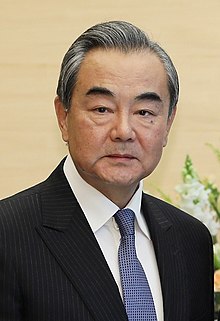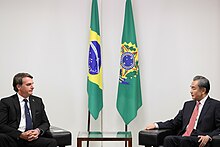Wang Yi (politician)
Wang Yi | |
|---|---|
王毅 | |
 Wang in November 2019 | |
| State Councilor of the People’s Republic of China | |
| Assumed office 19 March 2018 | |
| Premier | Li Keqiang |
| 11th Minister of Foreign Affairs | |
| Assumed office 16 March 2013 | |
| Premier | Li Keqiang |
| Deputy | Le Yucheng |
| Party Secretary | Zhang Yesui |
| Preceded by | Yang Jiechi |
| 8th Director of the Taiwan Affairs Office | |
| In office 1 June 2008 – 16 March 2013 | |
| Premier | Wen Jiabao |
| Preceded by | Chen Yunlin |
| Succeeded by | Zhang Zhijun |
| Chinese Ambassador to Japan | |
| In office 26 September 2004 – 24 September 2007 | |
| Preceded by | Wu Dawei |
| Succeeded by | Cui Tiankai |
| Personal details | |
| Born | 19 October 1953 Beijing, China |
| Political party | Communist Party of China (1981-present)[1] |
| Alma mater | Beijing International Studies University China Foreign Affairs University |
Wang Yi (Chinese: 王毅; pinyin: Wáng Yì; born 19 October 1953) is a senior Chinese diplomat and politician. He formerly served as China's Vice Foreign Minister, Ambassador to Japan and Director of the Taiwan Affairs Office. He has served as the Foreign Minister since March 2013 and a State Councilor since March 2018.[2]
Personal life[]
Wang was born in Beijing. After graduating from high school in September 1969, he was sent to Northeast China. He subsequently served in the Northeast Construction Army Corps in Heilongjiang Province for eight years.
In December 1977, Wang returned to Beijing, and in the same year was enrolled in the department of Asian and African Languages of Beijing International Studies University. He studied the Japanese language at the institution, graduating in February 1982 with a bachelor's degree. He is known to speak fluent English and Japanese.[3]
Wang's wife is the daughter of Qian Jiadong, who was the secretary of Zhou Enlai. He has a daughter.[4]
Career[]
Early career[]
Upon graduation from university, Wang was sent to the Asian section of the Ministry of Foreign Affairs by his father-in-law, where he began his career as a diplomat. In September 1989, he was sent to the Chinese embassy in Japan and served there for five years. When he returned to China in March 1994, Wang was appointed as vice section chief of the Asian section of the foreign ministry and was promoted to section chief the next year. From August 1997 to February 1998, Wang was a visiting scholar at the Institute of Foreign Relations of Georgetown University in the United States. Soon after his return, he was promoted to assistant minister and the director of office of policy research. From September 1999, Wang studied international relations at China Foreign Affairs University and obtained a doctor's degree. In February 2001, Wang was elevated to Deputy Minister of Foreign Affairs, in charge of Asian affairs. He was then the youngest Deputy Minister.
In September 2004, Wang was appointed as China's Ambassador to Japan. He served in this post until September 2007. In June 2008, Wang succeeded Chen Yunlin as the director of Taiwan Affairs Office of the State Council of China.[5]
Minister of Foreign Affairs[]

Appointment[]
On 16 March 2013, Wang was appointed Minister of Foreign Affairs after he was approved by the Congress.[6]
Middle East mediation[]
Wang initiated a significant state visit to the Middle East in December 2013 to visit Israel and Palestine. He discussed with leaders of both countries the importance of the nuclear agreement with Iran and the importance of the continued peace talks, saying "War does not solve the problems. Violence increases the hatred. The peace talks are the appropriate and the only path".[7] In November 2017, he expressed 3 points (counter-terrorism, negotiation and reconstruction) to improve Syria's situation.[8]
Wang criticized the speed and timing of withdrawal of the American-led NATO forces from Afghanistan and urged them to withdraw in a "responsible and orderly manner".[9]
China-Somalia Summit[]
In June 2014, during the China-Arab summit in Beijing, Foreign Minister Wang met his Somali counterpart Abdirahman Duale Beyle to discuss bilateral cooperation between China and Somalia. The meeting was held at the Chinese foreign ministry center and focused on trade, security and reconstruction. Among the issues discussed were the various Chinese development projects that are in the process of being implemented in Somalia. Beyle also indicated that the Chinese authorities are slated to broaden their support for Somalia, which would serve to create new employment opportunities. Additionally, Wang commended the Somali federal government on its peace-building efforts. He likewise reaffirmed the historically close diplomatic ties between both territories, recalling China's recognition of the nascent Somali Republic in 1960 and Somalia's subsequent campaigning which helped the PRC government attain a position on the United Nations Security Council.[10]

East Asia[]
On the evening of 15 April 2018, Wang was received by his Japanese counterpart Taro Kono, on the first such official visit of a Foreign Minister of China to Japan since November 2009.[11]
Canadian journalist incident[]
During a joint news conference in Ottawa on 1 June 2016, with Canadian Minister of Foreign Affairs Stéphane Dion, Wang responded to Canadian reporter Amanda Connolly of online news site IPolitics over a question she raised regarding human rights in China, saying "Your question was full of prejudice against China and an arrogance that comes from I don’t know where. This is totally unacceptable to me".[12][13][14]

Xinjiang re-education camps[]
Wang Yi said the world should ignore "gossip" about Xinjiang re-education camps.[15] In March 2021, Wang said that "We welcome more people to visit Xinjiang - seeing is believing. This is the best way to debunk rumours."[16] However, journalists from the BBC have reported being followed by unmarked cars, and being chased out of restaurants and shops, and being forced to delete footage while trying to report from Xinjiang.[17]
COVID-19[]
It was reported that during Wang's visit in Norway in August 2020, he said that while China was the first country to report the existence of the virus to the World Health Organization, "it does not mean that the virus originated in China. Actually, for the past months, we have seen reports ... showing that the virus emerged in different parts of the world, and may have emerged earlier than in China."[18]

US sanctions[]
On 22 February 2021, Wang Yi urged the administration of US President Joe Biden to lift the sanctions on trade and people-to-people contact imposed by his predecessor, Donald Trump. At the Foreign Ministry forum on US-China relations, he said that the US "must not interfere in the internal affairs of China".[19]
Hong Kong[]
In March 2021, Wang supported the decision to have only "patriots" rule Hong Kong, stating that "loving Hong Kong and loving the motherland are consistent requirements...in the past 24 years since Hong Kong's [handover], no one has cared more about the [SAR's] democracy, prosperity and stability than the central government."[16]
State Councilor[]
In March 2018, Wang was appointed as a State Councilor.[20]
Internet celebrity[]
In July 2016, Wang became an internet celebrity on the Chinese micro-blog Sina Weibo. A fan club on Weibo devoted to Wang has more than 130,000 followers.[21]
The British news agency Reuters commented, China has become increasingly aggressive in the South China Sea, said that the recent statements of Foreign Minister Wang Yi have "rejected the values of Confucianism", which teaches: "It is inhumane to take what is belong to others as one's own, and to appropriate lawful territory of the neighbors "comrades and brothers" is disloyal and ungrateful, sending a oil-rig and warships into neighboring EEZ is disrespectful, it is disloyal to speak about peace but act always in war and aggression, using deceitful, untruthful words, sophism, exaggeration to justify the ambition of territorial expansion is unwise."
See also[]
References[]
- ^ https://www.fmprc.gov.cn/mfa_eng/wjb_663304/wjbz_663308/
- ^ "Foreign Minister Wang Yi". The US-China Business Council. Retrieved 18 April 2021.
- ^ Ford, Peter (18 March 2013). "The new face of Chinese diplomacy: Who is Wang Yi?". Christian Science Monitor. Beijing. Retrieved 14 May 2020.
- ^ Sun, Mantao (November 2016). "外交部12位部领导全部公布婚育状况". politics.gmw.cn.
- ^ "Biography of Wang Yi". China Vitae. Retrieved 28 December 2010.
- ^ "China People's Congress approves new cabinet". BBC. 16 March 2013. Retrieved 16 March 2013.
- ^ "China FM: Iran deal 'first step' toward settling nuclear issue". The Times of Israel. 19 December 2013. Retrieved 14 May 2020.
- ^ "Wang Yi: Counter-terrorism, dialogue and reconstruction are three key points for solving Syrian issue at new stage". Embassy of the People's Republic of China in the United States of America. Retrieved 9 January 2019.
- ^ "China: Collective Efforts Required to Contain Afghan Insecurity 'Spillover' | Voice of America - English". www.voanews.com. Archived from the original on 18 July 2021.
- ^ "Foreign affairs minister meets his Chinese counterpart". Goobjoog. 6 June 2014. Archived from the original on 7 June 2014. Retrieved 6 June 2014.
- ^ "China foreign minister Wang Yi visits Japan for talks on North Korea, regional issues". The Straits Times. AFP. 15 April 2018. Retrieved 14 May 2020.
- ^ Buckley, Chris (2 June 2016). "China's Foreign Minister Castigates Canadian Reporter for Rights Question". The New York Times. Retrieved 14 May 2020.
- ^ "China berates Canadian reporter". CNN. 2 June 2016. Retrieved 14 May 2020.
- ^ Kassam, Ashifa; Phillips, Tom (2 June 2016). "Chinese minister vents anger when Canadian reporter asks about human rights". The Guardian. Beijing.
- ^ "Academics condemn China over Xinjiang camps, urge sanctions". Al-Jazeera. 27 November 2018. Retrieved 14 May 2020.
- ^ a b "'Only Chinese people have a say in China's affairs' - RTHK". news.rthk.hk. Retrieved 16 March 2021.
- ^ "China's pressure and propaganda - the reality of reporting Xinjiang". BBC News. 15 January 2021. Retrieved 16 March 2021.
- ^ Fouche, Gwladys. "Senior Chinese diplomat Wang Yi casts doubt on coronavirus originating in China". Reuters. Archived from the original on 28 August 2020. Retrieved 28 August 2020.
- ^ "China urges US to lift trade restrictions, stop interference". The Associated Press. Retrieved 22 February 2021.
- ^ Ng, Teddy. "China promotes foreign minister Wang Yi to state councillor, General Wei Fenghe named defence minister". South China Morning Post.
- ^ "People Are Super Thirsty Over This Diplomat And It's Kinda Weird".
External links[]
| Wikimedia Commons has media related to Wang Yi (politician). |
| Wikiquote has quotations related to: Wang Yi |
- Official website
- Appearances on C-SPAN
- Foreign Ministers of the People's Republic of China
- State councillors of China
- 1953 births
- Living people
- Ambassadors of China to Japan
- Beijing International Studies University people
- 20th-century Chinese politicians
- 21st-century Chinese politicians
- Members of the 19th Central Committee of the Chinese Communist Party
- Members of the 18th Central Committee of the Chinese Communist Party
- Members of the 17th Central Committee of the Chinese Communist Party


